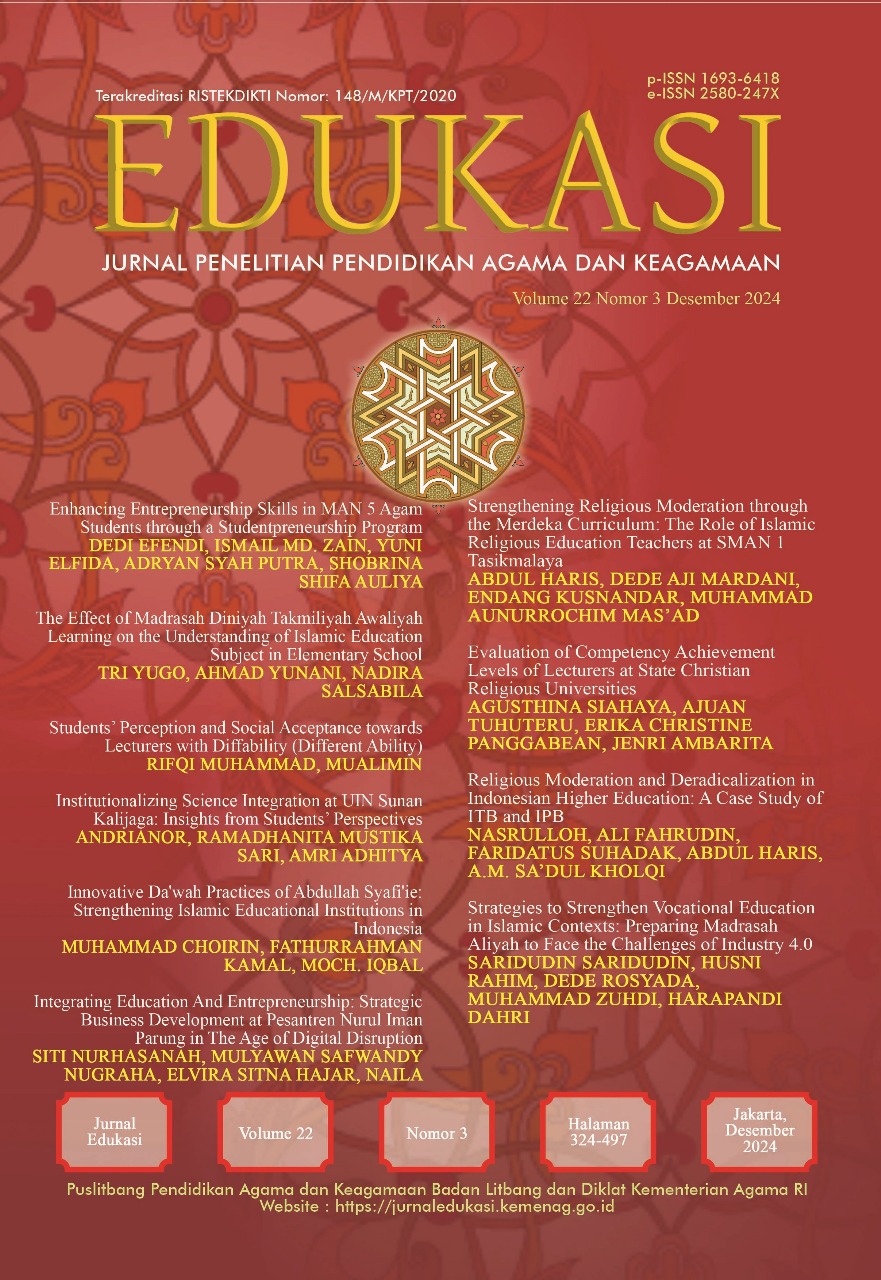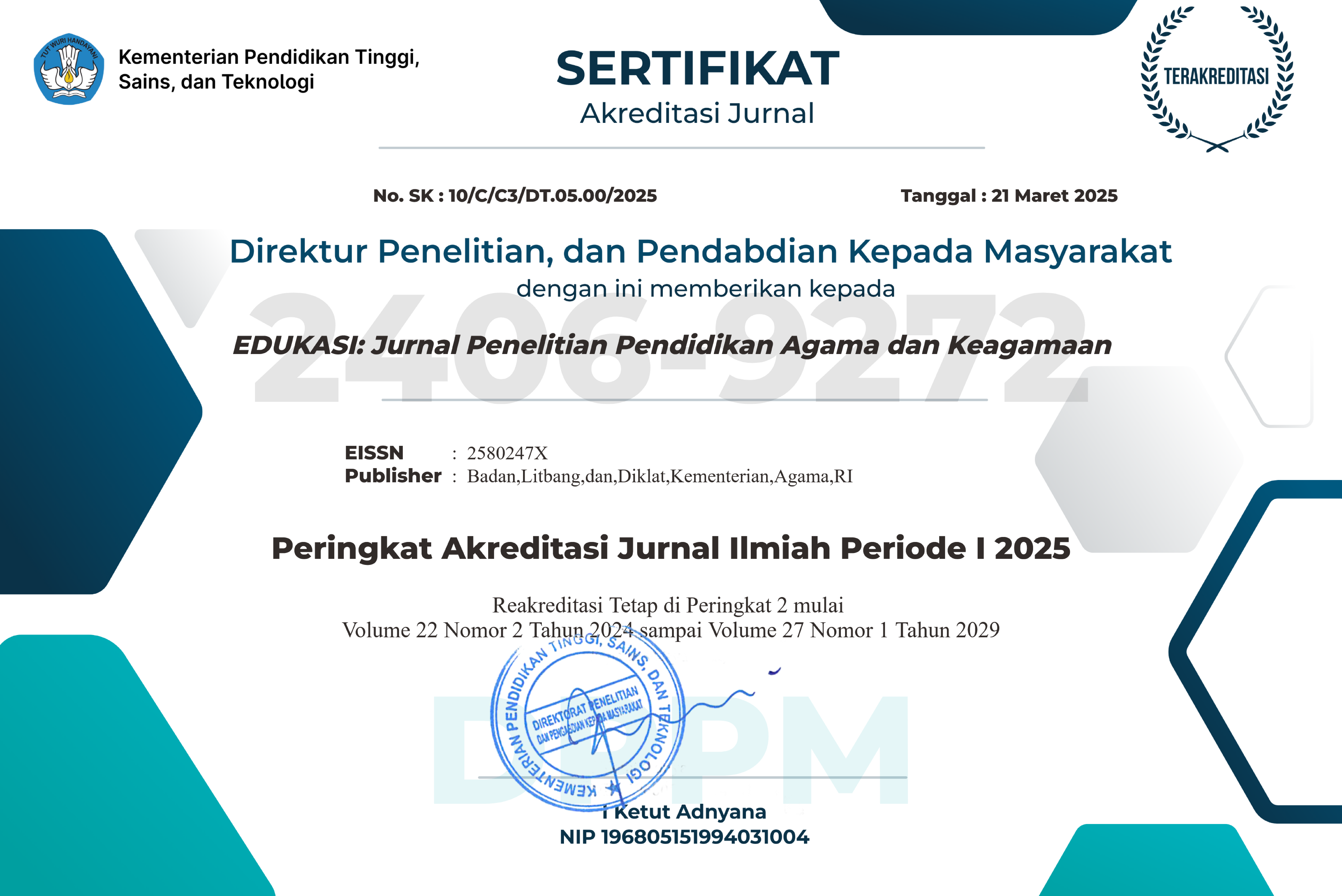Religious Moderation and Deradicalization in Indonesian Higher Education: A Case Study of ITB and IPB
DOI:
https://doi.org/10.32729/edukasi.v22i3.1974Keywords:
Deradicalization, Higher Education, Religious Moderation, RadicalismAbstract
This study aims to determine the internalization of religious moderation among Muslim students at ITB and IPB and its implications for the deradicalization movement in Indonesia. There are four main pillars that indicate national commitment: tolerance, non-violence, and respect for local traditions and culture. Two important factors motivated the writing of this article: first, the suspicion that radicalism occurs among students, and second, the belief that most radicalism occurs on non-religious campuses due to a lack of understanding of Islamic religious sources. Are these assumptions true? Therefore, this research was conducted on the campuses of ITB and IPB, which are well-known non-religious campuses in Indonesia. This research employed a qualitative method with a phenomenological approach, collecting data through in-depth interviews. The study concluded that the internalization of moderation at IPB and ITB is very good, drawing insights from various sources including the campus environment, social media, several studies, and the broader community. Students at both campuses generally exhibit a moderate attitude, although some students' understanding of moderation is not yet fully developed. For example, when asked to choose a president, 45% of students chose a Muslim candidate, while 40% based their choice on justice and skills rather than religion. Based on the moderate attitudes of students at both universities, the behavior of religious radicalism is unlikely to occur or even exist. Thus, students on both campuses are considered to have implemented the four main pillars of religious moderation.
Downloads
References
Afidhayanti, S., Nasution, A. K., & Wijaya, W. (2022). Tradisi Rumpak-Rumpak di Era Milenial : Studi Bibliografi. International Conference on Tradition and Religious Studies, 1(1), 192–198. https://proceedings.radenfatah.ac.id/index.php/lc-TiaRS/article/view/129
Alabdulhadi, M. M. J. (2024). Practices of Islamic education teachers in promoting moderation (wasatiyyah) values among high school students in Kuwait: challenges and obstacles. Cogent Education, 11(1). https://doi.org/10.1080/2331186X.2024.2365577
Alvian, R. A. (2023). How Extremist Movements Delegitimise Religious Moderation Campaigns: A Case of Hizbut Tahrir Indonesia (2018-2022). Perspectives on Terrorism, 17(3), 23–41. https://doi.org/10.19165/MDOT2199
As’ad. (2021). Being al-wasatiyah agents: The role of azharite organization in the moderation of Indonesian religious constellation. Journal of Islamic Thought and Civilization, 11(2), 124–145. https://doi.org/10.32350/jitc.11.2.07
Burga, M. A. (2022). Reinforcing Religious Moderation through Local Culture-Based Pesantren. Jurnal Pendidikan Islam, 8(2), 145–162. https://doi.org/10.15575/jpi.v8i2.19879
Hanafi, Y. (2022). Students’ perspectives on religious moderation: A qualitative study into religious literacy processes. HTS Teologiese Studies / Theological Studies, 78(1). https://doi.org/10.4102/hts.v78i1.7638
Haryani, E. (2020). Pendidikan Moderasi Beragama untuk Generasi Milenia: Studi Kasus “Lone Wolf” pada Anak di Medan Religious Moderation Education for The Milenian Generation: A Case Study ’Lone Wolf ’In Children in Medan. 18(2), 145–158. http://jurnaledukasikemenag.org
Hati, L. P. (2023). Religious Harmony Forum: Ideal Religious Moderation in the Frame of Building Tolerance in Medan City, Indonesia. Pharos Journal of Theology, 104(4). https://doi.org/10.46222/pharosjot.104.420
He, J. J. (2022). A phenomenological theory of superconductor diodes. New Journal of Physics, 24(5). https://doi.org/10.1088/1367-2630/ac6766
Helmawati, H., Marzuki, M., Hartati, R. S., & Huda, M. (2024). Islamic Religious Education and Religious Moderation at University. EDUKASI: Jurnal Penelitian Pendidikan Agama Dan Keagamaan, 22(1), 111–124. https://doi.org/10.32729/ edukasi.v22i1.1689
Ismail, F. (2023). The Religious Moderation and Decreasing Muslim Students’ Identity. Journal of Higher Education Theory and Practice, 23(17), 93–101. https://doi.org/10.33423/jhetp.v23i17.6549
Jannah, S. S., Tyas, W. I., & Sopiandi, A. (2022). Penerapan Arsitektur Kontekstual pada Fasad Gedung Akademik dan Perkantoran IPB (Institut Pertanian Bogor) Baranangsiang. Lakar: Jurnal Arsitektur, 5(2), 84. https://doi.org/10.30998/lja.v5i2.14243
Jati, W. R. (2022). From Intellectual To Advocacy Movement: Islamic Moderation, the Conservatives and the Shift of Interfaith Dialogue Campaign in Indonesia. Ulumuna, 26(2), 472–499. https://doi.org/10.20414/ujis.v26i2.572
Karim, H. A. (2019). Implementasi Moderasi Pendidikan Islam Rahmatallil ’Alamin dengan Nilai-Nilai Islam. Ri’ayah: Jurnal Sosial Dan Keagamaan, 4(01), 1. https://doi.org/10.32332/riayah.v4i01.1486
Khotimah, K. (2023). The realising of religion moderation in Tareqa Al-Yusriyyah As-Siddiqiyyah Ash-Shadhiliyyah. HTS Teologiese Studies / Theological Studies, 79(1). https://doi.org/10.4102/HTS.V79I1.7964
Kurniawan, B. D. (2023). Muhammadiyah and Religious Moderation: Response to Actions of Muhammadiyah to Prevent Modern Radicalism (Case Study of Leadership Period 2015 - 2021). Sociologia y Tecnociencia, 13(1), 102–123. https://doi.org/10.24197/st.1.2023.102-126
Lewis, M. A. (2023). The New Sect of Latitude Men: Religious Toleration and Moderation in Revolutionary and Restoration England. An Anthology of the Cambridge Platonists: Sources and Commentary, 60–64. https://doi.org/10.4324/9781003183150-9
Ma’arif, S. (2023). Islamic moderation in education and the phenomenon of cyberterrorism: A systematic literature review. Indonesian Journal of Electrical Engineering and Computer Science, 31(3), 1523–1533. https://doi.org/10.11591/ijeecs.v31.i3.pp1523-1533
Mubarok, A. A., & Rustam, D. G. (2019). Islam Nusantara: Moderasi Islam di Indonesia. Journal of Islamic Studies and Humanities, 3(2), 153–168. https://doi.org/10.21580/jish.32.3160
Muhaemin. (2023). Religious Moderation in Islamic Religious Education as a Response to Intolerance Attitudes in Indonesian Educational Institutions. Journal of Social Studies Education Research, 14(2), 253–274.
Muhajir, A. (2024). Education in Religious Moderation to Counter Radicalism. European Journal for Philosophy of Religion, 16(1), 194–213. https://doi.org/10.24204/ejpr.2023.4393
Mukhibat, M. (2024). Development and evaluation of religious moderation education curriculum at higher education in Indonesia. Cogent Education, 11(1). https://doi.org/10.1080/2331186X.2024.2302308
Mustakim, Z. (2021). Empowering Students as Agents of Religious Moderation in Islamic Higher Education Institutions. Jurnal Pendidikan Islam, 7(1), 65–76. https://doi.org/10.15575/jpi.v7i1.12333
Nasir, M. (2021). Keeping the middle path: Mainstreaming religious moderation through Islamic higher education institutions in Indonesia. Indonesian Journal of Islam and Muslim Societies, 11(2), 213–241. https://doi.org/10.18326/ijims.v11i2.213-241
Nasrulloh, N. (2017). Kontekstualitas dan Historisitas Matan Hadis-Hadis Peperangan terhadap Non-Muslim. Jurnal Theologia, 28(1), 165–182. https://doi.org/10.21580/teo.2017.28.1.1322
Pamungkas, F. M., & Gumilar, S. (2022). Sejarah Perkembangan Masjid Salman ITB dalam Bidang Sosial Keagamaan Tahun 2015-2022. 3, 36–48.
Qodir, Z. (2019). Muhammadiyah Memperkuat Moderasi Islam Memutus Radikalisme. Maarif, 14(2), 12–29. https://doi.org/10.47651/mrf.v14i2.58
Rahman, Y. (2022). Critical Thinking and Religious Moderation: Instilling Religiously Moderate Values through the Teaching of Islamic Philosophy in Indonesia. Journal of Indonesian Islam, 16(1), 49–74. https://doi.org/10.15642/JIIS.2022.16.1.49-74
Salsabilah, N., Maryamah, Nopriani, H., & Pebriani, E. (2023). Analisis nilai-nilai pendidikan karakter dalam tradisi masyarakat melayu di Kota Palembang. Jurnal Ilmiah Multidisiplin, 2(7), 508–514.
Setiawan, Z. (2018). Relasi Penerimaan Pancasila oleh Ormas Keagamaan terhadap Pengokohan Nasionalisme dan Kerukunan antar Umat Beragama (Studi Kasus Nahdlatul Ulama dan Hizbut Tahrir Indonesia). Sosio Dialektika, 2(2), 1–21. https://doi.org/10.31942/sd.v2i2.2093
Suprapto. (2020). Integrasi Moderasi Beragama dalam Pengembangan Kurikulum Pendidikan Agama Islam Integration of Religious Moderation in the Development of The Islamic Religious Education. EDUKASI: Jurnal Penelitian Pendidikan Agama Dan Keagamaan, 18(3), 355–368. http://jurnaledukasikemenag.org
Syahbudin, Z. (2023). Developing Students’ Religious Moderation through Group Counseling at Islamic Higher Education. Jurnal Pendidikan Islam, 9(1), 15–28. https://doi.org/10.15575/jpi.v0i0.22977
Syaifuddin, M. (2024). Lecturers’ Resistance to Religious Moderation Policy in Handling Radicalism: Evidence from State Islamic University of Sultan Syarif Kasim Riau, Indonesia. Pakistan Journal of Life and Social Sciences, 22(2), 3314–3329. https://doi.org/10.57239/PJLSS-2024-22.2.00244
Vaiana, N. (2023). Classification and unified phenomenological modeling of complex uniaxial rate-independent hysteretic responses. Mechanical Systems and Signal Processing, 182. https://doi.org/10.1016/j.ymssp.2022.109539
Yani, M. T. (2023). Educational Experience Insertion Model Of Religious Moderation And National Defence As Efforts To Prevent Radicalism And Communism Via Islamic Religious Education Instructions. Artseduca, 2023(36), 111–124. https://doi.org/10.6035/artseduca.3610
Zamzami, M. (2023). Mainstreaming Religious Moderation in the Digital Space: An Examination of Islami.co Web Portal in the Perspective of Jürgen Habermas’ Communicative Rationality. Jurnal Komunikasi: Malaysian Journal of Communication, 39(1), 73–91. https://doi.org/10.17576/JKMJC-2023-3901-05
Zulkifli. (2023). The Construction of Religious Moderation Among Indonesian Muslim Academics. Teosofi: Jurnal Tasawuf Dan Pemikiran Islam, 13(2), 337–366. https://doi.org/10.15642/teosofi.2023.13.2.337-366
Downloads
Published
Issue
Section
License
Copyright (c) 2024 Ali Fahrudin, Nasrulloh Nasrulloh, Faridatus Suhadak, Abdul Haris, A.M. Sa’dul Kholqi

This work is licensed under a Creative Commons Attribution-ShareAlike 4.0 International License.








